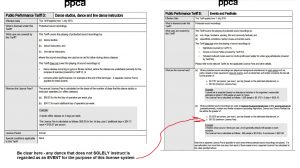Music and why
MUSIC – plays arguably the 2nd major role in dance. Whilst you certainly can dance in silence, we all know the perfect partner is music.
So whats the big deal and who cares?
Questions often asked: I pay APRA, what is APRA, who is (PPCA we go further with these seemingly MIA folks later) I purchased the CD, ITune etc etc etc.
PERSPECTIVE: You can liken it to your income – whatever that may be. Replace Music with your art, ability or service:
The quagmire that is music and royalty rights that can seem somewhat elusive, the why and how of it all can be daunting even when you try and do the right thing.
Basically comes down to a number of things:
Artists income Payments are received by way of :
• Performance: Paid to play/sing at a venue
• For the sale of recorded music (CD – Itune – Download) this is a one off payment for the purchase made to whoever recorded the finished piece.
• Royalties: split for
o Music (whoever wrote the tune)
o Words (whoever penned the written words)
o Singing (who sang the Vocals)
o Recorded Performance (that you playback, the public performance of the recorded works)
Which is why there is more than one license and overseer of the music world and more than one set of criteria which never seems to be explained in plain English.
Did you know on average if you pay for a music license (ie if the venue you operate in does not cover you) the minimum fee for relevant music licenses is around $218 (for up to 14 attendee students for one day per week) anything over 14 attendees or more than one day per week and the fees go up. NOTE: Teaching and not related to “SOCIALS” no dance after class, no walkthrough before a social. Socials require a different license and commence on average at $82.50 per SOCIAL (unless the take is over $4k)
Add to this the fact there are millions of artists and recorded works around the world and HOW is that policed? Ie: How do they pay royalties to Mr & Mrs Musician who perform at venues that do not participate – eg: How do they know how many dance songs were played by who/where each day?
Answer mostly is “they don’t” so they distribute by way of a complex system that is NOT at all easily explained.
Suffice to say many musicians do NOT receive royalties as they are entitled.
NOTE: If you do the right thing and pay your APRA AMCOS ARIA PPCA licenses there is a very high probability the money goes to artists that do NOT provide dance music.
(Think about that for a minute)
We have all heard the “who cares” attitude I can pirate, download who would know. Perhaps that is true but lets get a little perspective here on the why:
If there is to be an up and coming generation of dance music – Sequenced dance music providers or even players there needs to be ——?
You guessed it – an INCOME for the art and profession.
Without that the many musicians that perform for love are on the decline and there is not likely to be any replacements as there is absolutely no incentive.
PERSPECTIVE: You can liken it to your income – whatever that may be. Replace Music with your art, ability or service:
eg: I am a dance instructor – I gain students who attend private or group lessons.
The entry fee is $15 per student – In some cases I collect the FIRST only entry fee for the student. In other cases I don’t even collect the first payment.
Under the above system as it currently operates, further entry or lesson fees for the Private students go to other random Dance instructors in another random State.
(Thinking)
Now add to that, under the above system as it currently operates – the Group Lesson student fees go to other random Dance instructors again in yet another random State.
and *I *the actual teacher or dance convener, I get NO INCOME what so ever from any subsequent teaching or instructions.
So it’s a matter of FAIR AND REASONABLE EQUITY
Without someone providing actual playlists, the right people will NEVER get paid.
The Dance world is but a tiny niche in the scheme of things and we just get passed by.
What has the Co-op done about this:
The Ballroom Co-op has negotiated a blanket license for
Australasian Performing Right Association
Australasian Mechanical Copyright Owners Society
Australian Recording Industry Association
This ensures ALL Dance musicians get a return including the Up and coming SCHOOL participants who can secure ongoing royalties and the next generation of musicians.
No it will not match a XFactor or other TV Stardom but it IS an honest income for honest input which is an alternative to the current “not a single thing” to entice the next generation of musicians to this area.
The one exception being PPCA
Phonographic Performance Company of Australia

Again – a matter of equity – you pay the separate licensing fee to PPCA to play the dance music – the fee goes to people who have nothing to do with dance music (this fact seems to escape those who control the returns with statements along the lines “if you dance we know what type of music you play.”)
The 4 Ballroom Co-op also has an option for this section to ensure your operations remain safe(the playing of “public performance of reproduced/recorded music).
MUSICIANS can find out more about our royalty, publishing, library and other options here.
The beta rollout of testing for sites and playlists has been an ongoing process, if you would like to have your input or say just let us know.
All that is required is a little of your time and feedback.
